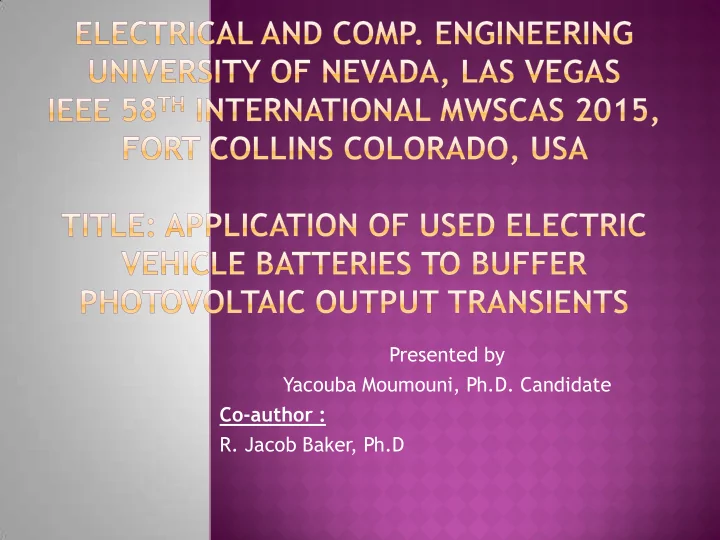

Presented by Yacouba Moumouni, Ph.D. Candidate Co-author : R. Jacob Baker, Ph.D
1. Abstract 2. Introduction 3. DESCRIPTION OF THE CPV SYSTEM UNDER STUDY 4. PROCEDURES AND CONTROL STRATEGIES 5. BATTERY PARAMETERS AND FUNCTIONS 6. RESULTS AND ANALYSIS 7. Conclusion 8. References Questions and Answers 2 IEEE 58th Int. MWSCAS 2015, Fort Collins, CO 7/29/2015
Methods to mitigate the effects of power transients associated with grid-tied concentrated photovoltaic (CPV) systems due to fast-moving cloud coverage Buffering CPV intermittency with used electric vehicle batteries Goals :1) to smooth out the intermittent solar power and; 2) to defer part of the peak load to a convenient time Real data were utilized to conduct this study Results showed 1) Unit was capable of a constant 20 kW; 2) Unit was able to shift the less valuable off-peak electricity to on-peak time 3 IEEE 58th Int. MWSCAS 2015, Fort Collins, CO 7/29/2015
Solar variability affects photovoltaic PV fields have large and frequent ramp events (challenge for grid operators) Cloud coverage is dependent on: system size, shape, transparency, speed, etc. Used electric-vehicle (EV) batteries are proposed 4 IEEE 58th Int. MWSCAS 2015, Fort Collins, CO 7/29/2015
Ways to reduce peak load Demand Side Management (DSM) Time Of Use pricing (TOU) Energy storage System (ESS) Absorption of surplus power Allowance of energy to be utilized at convenience 5 IEEE 58th Int. MWSCAS 2015, Fort Collins, CO 7/29/2015
Research focus Smoothing the CPV power transients due to cloud coverage with energy storage system, ESS1 Shifting less expensive power to the peak demand time, with ESS2 6 IEEE 58th Int. MWSCAS 2015, Fort Collins, CO 7/29/2015
Highly efficiency Triple junction Less material used 7 IEEE 58th Int. MWSCAS 2015, Fort Collins, CO 7/29/2015
Dual-axis tracking Eff. in excess of 29% Name plate AC capacity 53kW ±5% Op. three phase 480VAC Op. Temp -10 o C to +50 o C Characteristics CPV Amonix 7700 8 IEEE 58th Int. MWSCAS 2015, Fort Collins, CO 7/29/2015
Output Cloudy Day Output Clear day 50 50 45 45 40 40 35 35 30 Power in KW Power in kW 30 25 25 20 20 15 15 10 10 5 5 0 0:00 4:48 9:36 14:24 19:12 0 -5 Hours 0:00 4:48 9:36 14:24 19:12 Time, min 9 IEEE 58th Int. MWSCAS 2015, Fort Collins, CO 7/29/2015
Collected Summer CPV 7700 data Collected NV Energy summer load Checked missing data prior to simulation Built Matlab codes 10 IEEE 58th Int. MWSCAS 2015, Fort Collins, CO 7/29/2015
Variables and Assumptions Variables 15kW Power (ref.) Battery capacity Assumptions Inv. Output was 38kW Inv. Eff. 88% Discharge time 0.34h for ESS1 Discharge time ESS2 6 hours Round trip loss 12% Battery nominal 24V Final ideal value achieved after few trials 11 IEEE 58th Int. MWSCAS 2015, Fort Collins, CO 7/29/2015
Output without ESS Diagram of the system 12 IEEE 58th Int. MWSCAS 2015, Fort Collins, CO 7/29/2015
System’s setup 13 IEEE 58th Int. MWSCAS 2015, Fort Collins, CO 7/29/2015
Designation kWh Functions Power ESS1 20 smoothening Load ESS2 368 shifting Both ESS Total 388 Functions 14 IEEE 58th Int. MWSCAS 2015, Fort Collins, CO 7/29/2015
Constant 20kW based on 20.436kWh Constant 238 kWh Load shifted, ESS2 ESS1 for the entire Summer 15 IEEE 58th Int. MWSCAS 2015, Fort Collins, CO 7/29/2015
Ways to reduce CPV Variability was investigated Power reliability and availability were increased Voltage, frequency, and p.f angle quality increased Proposed Used automotive batteries for Economic and Environmental reasons Intent was to prove the technical feasibility of a grid-tied CPV Study aims to foster a large scale renewable penetration Results show that the proposed size of the partially degraded battery (388kWh) achieves a desired outcome of a constant 258kW of power 16 IEEE 58th Int. MWSCAS 2015, Fort Collins, CO 7/29/2015
R. McCann, R. Winkelman , and D. Moody, “A Battery Storage System for Distributed Demand Response in Rural Environments,” IEEE Trans. Power … , 2008. C. Hill, M. Such, and D. Chen, “Battery energy storage for enabling integration of distributed solar power generation,” Smart Grid, IEEE … , vol. 3, no. 2, pp. 850 – 857, 2012. Y . Moumouni and R. Jacob Baker, " CPV Battery Buffer Sizing and Economic Analysis,” accepted for publication in MWSCAS 2015. C. Venu, Y . Riffonneau, S. Bacha, and Y . Baghzouz , “Battery Storage System sizing in distribution feeders with distributed photovoltaic systems,” 2009 IEEE Bucharest PowerTech , pp. 1 – 5, Jun. 2009. S. Schoenung and C. Burns, “Utility energy storage applications studies,” Energy Conversion, IEEE … , pp. 1 – 2, 1996. J. Marcos, O. Storkël, L. Marroyo , M. Garcia, and E. Lorenzo, “Storage requirements for PV power ramp- rate control,” Sol. Energy , vol. 99, pp. 28 – 35, Jan. 2014. P . Denholm and R. M. Margolis, “Evaluating the limits of solar photovoltaics (PV) in electric power systems utilizing energy storage and other enabling technologies,” Energy Policy , vol. 35, no. 9, pp. 4424 – 4433, Sep. 2007. C. W. Tan, T . C. Green, and C. a. Hernandez-Aramburo , “A stochastic method for battery sizing with uninterruptible- power and demand shift capabilities in PV (photovoltaic) systems,” Energy , vol. 35, no. 12, pp. 5082 – 5092, Dec. 2010. Aaron Sahm, private communication, Center for Energy Research, CER January 10 th , 2012. J. VENTRE, Photovoltaic systems engineering , Second. Boca Raton London New York Washington, D.C: CRC Press, 2004. Y . Moumouni and R. F . Boehm, “utilization of Energy Storage to Buffer PV Output during Cloud transients,” 2014, Applied Mechanics and Materials, 705, 295. A. EPA, “Inventory of US greenhouse gas emissions and sinks: 1990 - 2009,” 2011. 17 IEEE 58th Int. MWSCAS 2015, Fort Collins, CO 7/29/2015
Thank you, 18 IEEE 58th Int. MWSCAS 2015, Fort Collins, CO 7/29/2015
Recommend
More recommend